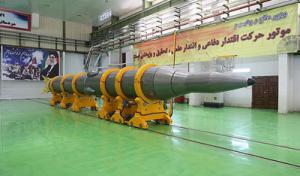IranU.S. to impose new sanctions on Iran over ballistic missile program
The United States is preparing a new round of economic sanctions against Iran after Iran had violated agreements related to its ballistic missile program by testing, on 10 October, an advanced version of one of its missiles. The ballistic missile agreement is unrelated to the nuclear agreement the P5+1 powers signed with Iran last summer. The nuclear program-related sanctions would begin to be lifted in 2016 if Iran fully complies with the requirements of the nuclear deal.

Sajil 2 on assembly dollies // Source: wikipedia.org
The United States is preparing a new round of economic sanctions against Iran after Iran had violated agreements related to its ballistic missile program by testing, on 10 October, an advanced version of one of its missiles.
The ballistic missile agreement is unrelated to the nuclear agreement the P5+1 powers signed with Iran last summer. The nuclear program-related sanctions would begin to be lifted in 2016 if Iran fully complies with the requirements of the nuclear deal.
The Wall Street Journal reports that the targets of the new measures are firms and individuals in Iran, Hong Kong, and the United Arab Emirates linked to Iran’s ballistic missile program.
The U.S. Treasury Department is now preparing sanctions on two Iran-linked networks which have been helping the country develop ballistic missiles in violation of agreements which Iran had signed. The sanctions would bar U.S. and foreign nationals from doing business with the firms and people in the networks. The U.S.-held assets of individuals and companies in the two networks will be frozen.
A senior U.S. official told the Guardian: “As we’ve said, we’ve been looking for some timeat options for additional actions related to Iran’s ballistic missile program based on our continued concerns about its activities, including the October 10th launch.
“We are considering various aspects related to additional designations, as well as evolving diplomatic work that is consistent with our national security interests. As always, we keep Congress informed about issues related to Iran sanctions, and will continue to do so as we work through remaining issues.”
The United States maintains it has the right to impose sanctions on Iranian entities involved in missile development, rights abuses, or international terrorism. The administration has argued all along the nuclear deal applies only to Iran’s nuclear program, and whatever economic relief Iran would be entitled to as a result of the agreement would be the result of its conduct on the nuclear front.
Other aspects of Iran’s policies, foreign or domestic, are treated separately from its conduct on nuclear issues.
The Treasury Department is set to impose sanctions against UAE-based Mabrooka Trading and its founder, Hossein Pournaghshband, for helping procure carbon fiber for the missile program.
The Journal notes that Pournaghshband also used a Hong Kong subsidiary for the procurement of heat-resistant material and financing.
The Treasury is also preparing sanctions against five Iranian officials who worked on the missile program.
